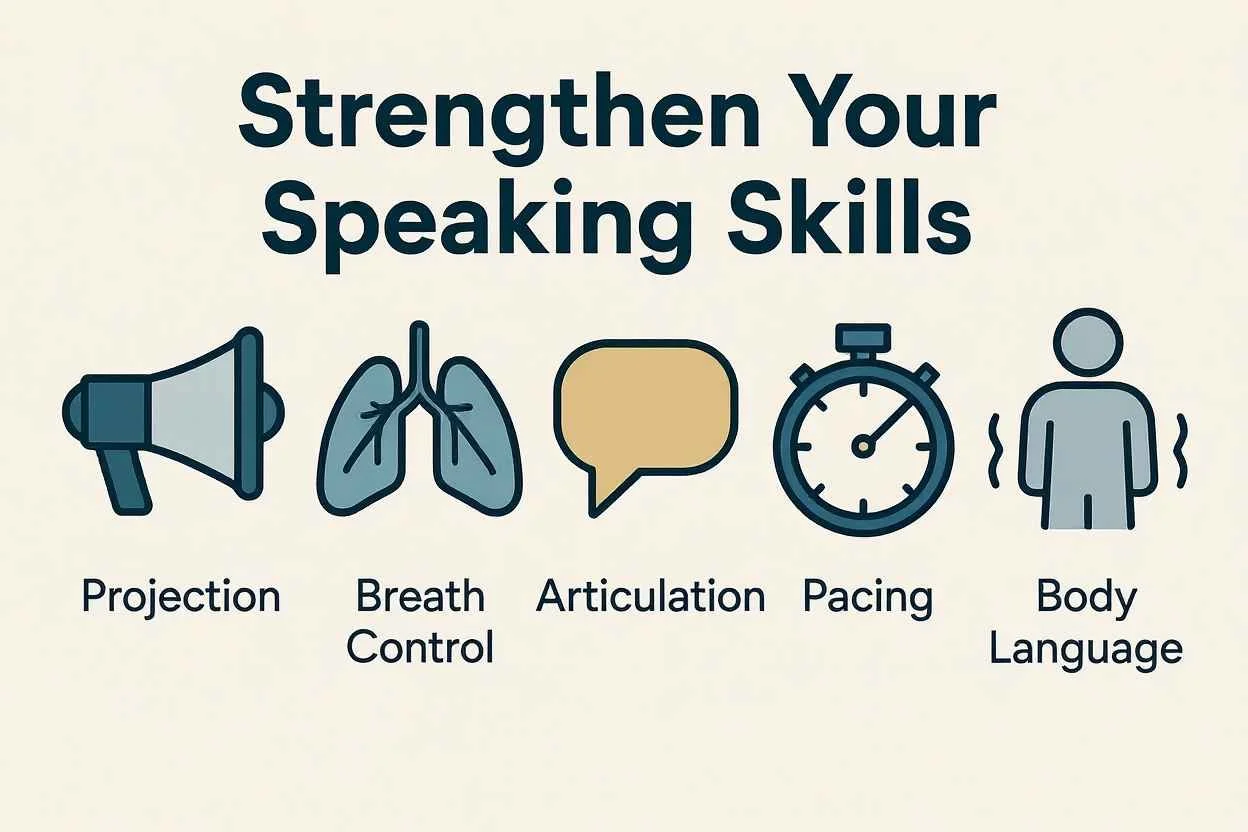Executive Voice Coaching to Refine Your Professional Tone
A strong executive presence involves more than the words you use. In meetings, presentations, and conversations with clients and colleagues, your voice plays a central role in how your message is received. Executive voice coaching helps professionals develop vocal tone, body language, and presentation skills that support clear and confident communication.
If your goal is to adjust pitch, improve articulation, or strengthen vocal stamina for public speaking, focused voice training can make a lasting difference in how you are heard and understood.
Key Takeaways:
Pitch and tone: The way your voice sounds shapes how others perceive your authority, credibility, and leadership style.
Executive presence: Voice coaching develops clarity, consistency, and influence across presentations, meetings, and client conversations.
Practical skills: Training focuses on projection, breath control, articulation, pacing, and body language to improve delivery.
Broad benefits: Professionals at all career stages can use voice coaching to strengthen confidence, connection, and leadership impact.
Why Pitch and Tone Matter in Executive Communication
How Voice Coaching Supports Executive Presence
What to Expect from Executive Voice Coaching
Who Benefits from Executive Voice Coaching
Signs You Might Benefit from Business Communication Coaching
Frequently Asked Questions About Executive Voice Training
How Connected Speech Pathology Can Help You Communicate Confidently
Why Pitch and Tone Matter in Executive Communication
The sound of your voice influences how others perceive your role, credibility, and leadership style. A voice that sounds strained, overly high, or too soft may unintentionally suggest hesitation. A voice that is too low or monotone may seem disconnected or disinterested.
These qualities affect how your message is received and how much authority is attached to your words. In professional settings, the sound of your voice influences how seriously you are taken, how clearly your message is understood, and how others respond to you.
Executive voice coaching helps professionals develop a voice that reflects their leadership goals and communication style. The way you sound can shift the dynamic in a meeting, change how your colleagues interpret your intent, and affect how your team receives feedback or direction.
A refined executive voice supports clarity, consistency, and presence. It helps leaders communicate with purpose and influence across presentations, conversations, and collaborative work.
Social perceptions also influence how pitch and tone are judged. Gender expectations, for example, may lead women to lower their pitch to be seen as more authoritative, while men may seek to soften their tone to improve approachability.
Voice training gives you tools to communicate effectively, express your message clearly, and project a strong executive presence that builds trust and strengthens professional relationships.
How Voice Coaching Supports Executive Presence
Once professionals gain awareness of how pitch and tone affect perception, the next step is learning how to use the voice as a tool for leadership. Executive voice coaching helps leaders speak with intention and consistency, matching vocal delivery to the message and the moment.
A confident executive voice helps you show authority, manage conversations more effectively, and maintain composure in high-pressure situations.
These skills apply directly to real-world leadership tasks. Voice coaching supports strong performance in presentations, meetings, interviews, and client communication. It also helps professionals adapt to different communication styles and audiences.
Paired with effective body language, vocal training enhances presence and credibility. The result is a communication style that increases clarity, improves engagement, and supports long-term success across a range of professional settings.
What to Expect from Executive Voice Coaching
Executive voice coaching begins with an individual assessment to understand your communication style, vocal patterns, and professional goals. Your vocal coach evaluates tone, pitch, articulation, and presence in the context of your role, audience, and industry. This first step lays the foundation for a training program that supports clarity, confidence, and a healthy voice.
During voice and speech coaching, you work on practical communication skills such as vocal projection, breath control, body language, and pacing. You rehearse real scenarios like client presentations, team meetings, and interviews.
The coaching process you select should be structured but personalized. Through consistent sessions, you will learn to communicate confidently, lead with influence, and develop a voice that strengthens executive presence.
Voice training also supports overall well-being by encouraging healthy vocal habits. This is essential for professionals who speak frequently in high-stakes environments.
Who Benefits from Executive Voice Coaching
Executive voice coaching is valuable for professionals at all stages of their careers. C-suite leaders, directors, consultants, and client-facing team members often seek this type of training to improve presentation skills, manage public speaking demands, or strengthen their communication in high-pressure conversations. It also supports emerging leaders who want to develop confidence, presence, and influence as they grow into new roles.
Professionals benefit from voice and speech coaching when preparing for presentations, interviews, workshops, or leadership transitions. Others want to refine their business communication skills to improve how they express ideas, listen to feedback, or connect with colleagues.
A vocal coach offers a unique approach that focuses on each person’s own voice while building the clarity, power, and consistency needed to lead. The skills developed in these sessions support career growth, enhance leadership impact, and help professionals communicate more effectively in every setting.
Signs You Might Benefit from Business Communication Coaching
You feel nervous speaking in groups.
People often ask you to repeat yourself.
Your voice feels strained by the end of the day.
You’re unsure if your tone matches your message.
You avoid speaking up in meetings or during presentations.
You receive feedback that your delivery sounds unclear, rushed, or flat.
This kind of self-awareness is often the first step toward lasting change. A communication-focused training program can help you address these challenges with clarity, confidence, and control.
Business Communication Skills Training
Check out our blog on business communication skills training for more information!
Frequently Asked Questions About Executive Voice Training
1. What does executive coaching include?
Executive voice coaching includes a personalized assessment, goal setting, and structured training sessions. These may cover voice training, articulation, tone, pacing, body language, and public speaking techniques. The coaching is tailored to your role, communication style, and industry needs.
2. How long should executive coaching sessions take?
Sessions typically last between 45 and 60 minutes. The length and frequency depend on your goals, availability, and what your vocal coach recommends based on your initial assessment and progress over time.
3. What are executive presentation skills?
Executive presentation skills refer to the ability to speak clearly, confidently, and persuasively in front of an audience. This includes using effective body language, a steady tone, well-paced delivery, and a message that aligns with your leadership role and communication goals.
4. Can voice coaching help with public speaking anxiety?
Voice coaching helps reduce public speaking anxiety by building vocal control, improving breath support, and increasing confidence. Over time, these skills help professionals feel more prepared and composed during presentations, interviews, and team meetings.
5. Is executive voice coaching only for people in leadership roles?
While leaders and client-facing professionals often use it, voice coaching benefits anyone who wants to improve communication skills, strengthen presence, or speak more clearly in professional settings.
How Connected Speech Pathology Can Help You Communicate Confidently
At Connected Speech Pathology, we specialize in helping professionals, students, and individuals from all backgrounds strengthen their communication skills. Our team provides personalized training programs designed to meet your specific goals.
We offer expertise in executive presence, public speaking, articulation, accent clarity, voice training, and interpersonal communication, ensuring that each session targets skills you can use immediately in your personal and professional life.
All of our services are delivered online so that you can work with a highly qualified coach from anywhere. We use proven methods to help you speak with clarity, express ideas with confidence, and connect more effectively with any audience.
Through tailored exercises, practical feedback, and ongoing support, you can develop a communication style that reflects your strengths, enhances your credibility, and helps you achieve your goals in every interaction.
Summary
Executive voice coaching helps professionals refine pitch, tone, articulation, and body language to project confidence and authority in every interaction. It supports leadership presence by improving clarity, building trust, and enhancing the way messages are received and interpreted.
Through personalized training, individuals develop the skills to communicate effectively in presentations, meetings, and high-stakes conversations. The result is a clear, consistent, and influential voice that strengthens professional relationships and supports long-term career success.
About the Author
Allison Geller is a communication coach, speech-language pathologist, and founder of Connected Speech Pathology, an international online practice providing professional communication coaching and speech therapy for children, teens, and adults. With more than two decades of experience, she has worked in medical and educational settings, published research on aphasia, and leads a team of specialists helping clients improve skills in public speaking, vocal presence, accent clarity, articulation, language, fluency, and interpersonal communication.










